Rock-star Obama, meet sceptical Israel
- Published
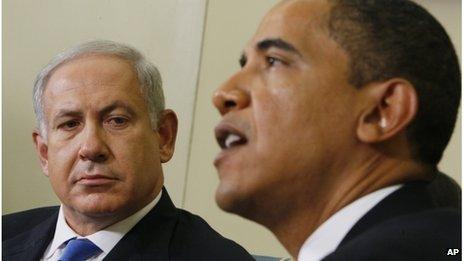
The two leaders have not had the easiest relationship
Some Israeli media outlets are calling Barack Obama's first trip to Israel as US president "operation unbreakable alliance".
It is the sort of overkill that underlines the fact that both sides have something to prove. Just don't hold your breath for history to be made.
The main purpose of Obama's visit seems to be to re-make his image with the Israeli people. A recent poll, external indicated only 10% of them had a favourable view of the president.
Obama critics at home have long claimed that he's no friend of Israel and say the proof positive is that he hasn't bothered to go there as president. By making this the first foreign trip of his second term he at least gets that out of the way.
He'll be only the fifth US president to go to Israel, but his recent predecessors Bill Clinton and George W Bush invested a lot in the relationship.
Obama offended some early on in his presidency by going to Cairo to make a high-profile speech to the Arab world, external but not continuing on to Israel. The speech also offended some Israelis because of the way he made a case for Israel's existence based on the horrors of the Holocaust rather than Jewish origins in the region. Expect him to correct that on this trip.
The White House of course attempts to counter all this criticism, retorting that Israel has no better ally, citing the defence co-operation since he became president.
'Rock star'
The US and Israel are indeed bound together tightly. But the president's relationship with Israeli Prime Minister Benjamin Netanyahu is fraught and dysfunctional.

Many Palestinians have lost faith in the peace process
Perhaps the low point was when Mr Netanyahu came to the White House and treated the president to lecture on Israeli history in front of the cameras. The president practised a policy of containment, his face rigid with diplomatically suppressed emotions.
One aim of the visit will be to present a chummier image. A sense of unity is important if Iran is going to believe that the two countries are capable of concerted action over its nuclear programme.
But it is the speech at a convention centre in Jerusalem, where he will talk directly to the Israeli public and the public watching at home, that is the real centrepiece of this trip.
Martin Indyk, former US ambassador to Israel, says: "He's a rock star. They will welcome him. He's bound to get a bounce. And that is very important. This is a public who will punish a prime minister who mishandles his relationship with a popular president.
"Netanyahu eats [opinion] polls for breakfast. He will know if the balance changes."
Mr Netanyahu is already weakened by recent election results, and any change in opinion polls could make him more pliant both over the question of Iran and issues at the heart of the Israeli-Palestinian conflict.
Pizza comparison
The downside of a speech that lavishes praise on Israel is that it may worsen Obama's image in the Arab world, where it has crashed from the dizzy heights of 2009.
The 2009 Cairo speech raised expectations so high that when little flowed from it many were gravely disillusioned.
Several experts on the region have told me that the Arab world expects little of Obama. People are no longer listening.
Syria and Iran are officially top of the trip's agenda. But everyone wants to know what the president will say about the Israeli-Palestinian conflict.
He's told both Jewish and Arab Americans that he won't come with any grand peace plan.
No wonder.
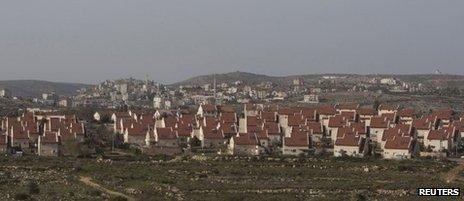
Jewish settlements in the West Bank are still hugely contentious
I keep hearing the same two things. The first is that this is just about the last chance for the two-state solution - the idea of Israel and an independent country called Palestine living side by side.
British Foreign Secretary William Hague has said it is "slipping away".
Many others I've spoken to echo him. This isn't just overblown rhetoric. It is based on a simple equation. The more Jewish settlements there are in the West Bank, including East Jerusalem, the more difficult it is for both sides to do a deal.
Some within Israel maintain that one key aim of the new Israeli government is to build even more such settlements. Certainly the composition of the new Israeli cabinet is interesting. The housing minister used to be a leader of the settlers' movement.
Marwan Muasher, who served as Jordan's first ambassador to Israel, says the settlements mean any proposed peace talks are "like two men arguing about a piece of pizza, while one of them is eating it".
The second common assumption is that that there is no real chance of getting talks going again right now. One party in the new government is explicitly against a two-state solution. There's no sense of urgency among the Israeli public. Egypt is in too delicate a state to go out on a limb. Jordan is under enough strain with a badly performing economy, Syrian refugees and internal instability. Saudi Arabia shows no enthusiasm. Many ordinary Palestinians are unenthusiastic.
One Arab expert told me: "The public is fed up with what they see as a sham, just theatre. The words 'peace process' are enough to throw some Palestinians into seizures."
Heat, no light?
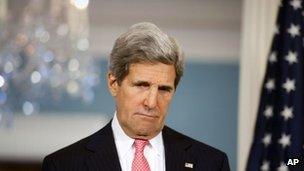
Some believe John Kerry might be the man to reignite the talks
So the only place momentum could come from is the US president. But he would be pushing against a door, tightly shut and triple locked by reality.
Mr Muasher says: "The stars are not going to align. The notion that you can leave it for now and pick it up later is over. So the president has to decide if he is going to do something very difficult. The answer is: 'No, he is not.'"
Before the trip Mr Obama held meetings with leaders of both the Jewish and Arab communities in the US. He suggested to them that he would appeal directly to the people on both sides of the conflict, telling them that to want peace is not enough - they must act.
Such fine words are easy, and are only to be expected.
The new Israeli government is only a few days old, so provides a good excuse for not coming up with anything more concrete. What matters is what happens next.
There are a few optimists who think Secretary of State John Kerry, who is accompanying the president, is absolutely determined to make an impact. They suggest after the visit he will put together detailed proposals that might at least get some talks going.
Under this scenario the president would keep aloof until the end of the year, when he might give another push. Hope springs eternal, but few have realistic hopes of anything coming of all this.
A US presidential visit to Israel is bound to generate headlines. Whether it will give birth to anything more lasting is much more open to question.
- Published13 February 2013
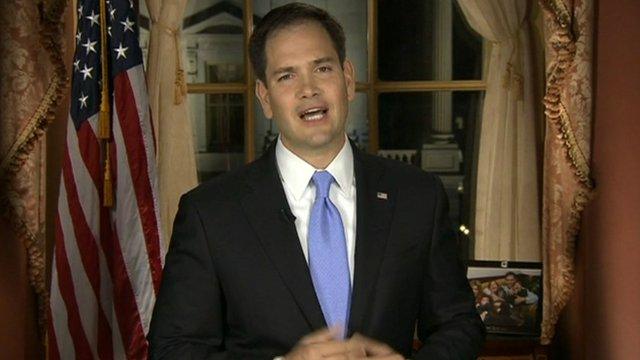
- Published7 March 2013
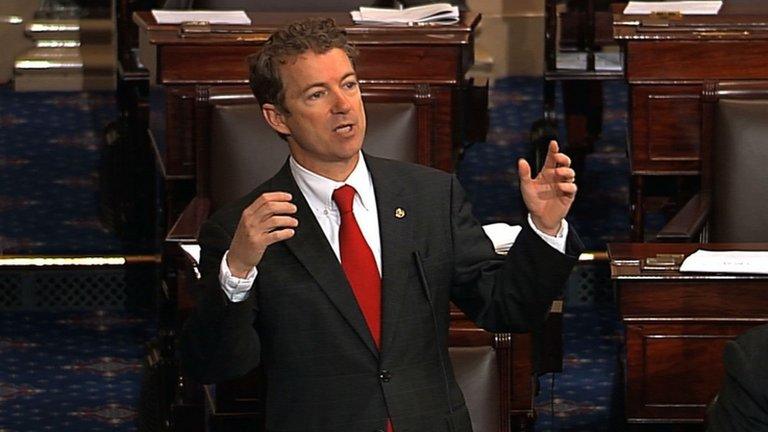
- Published1 March 2013